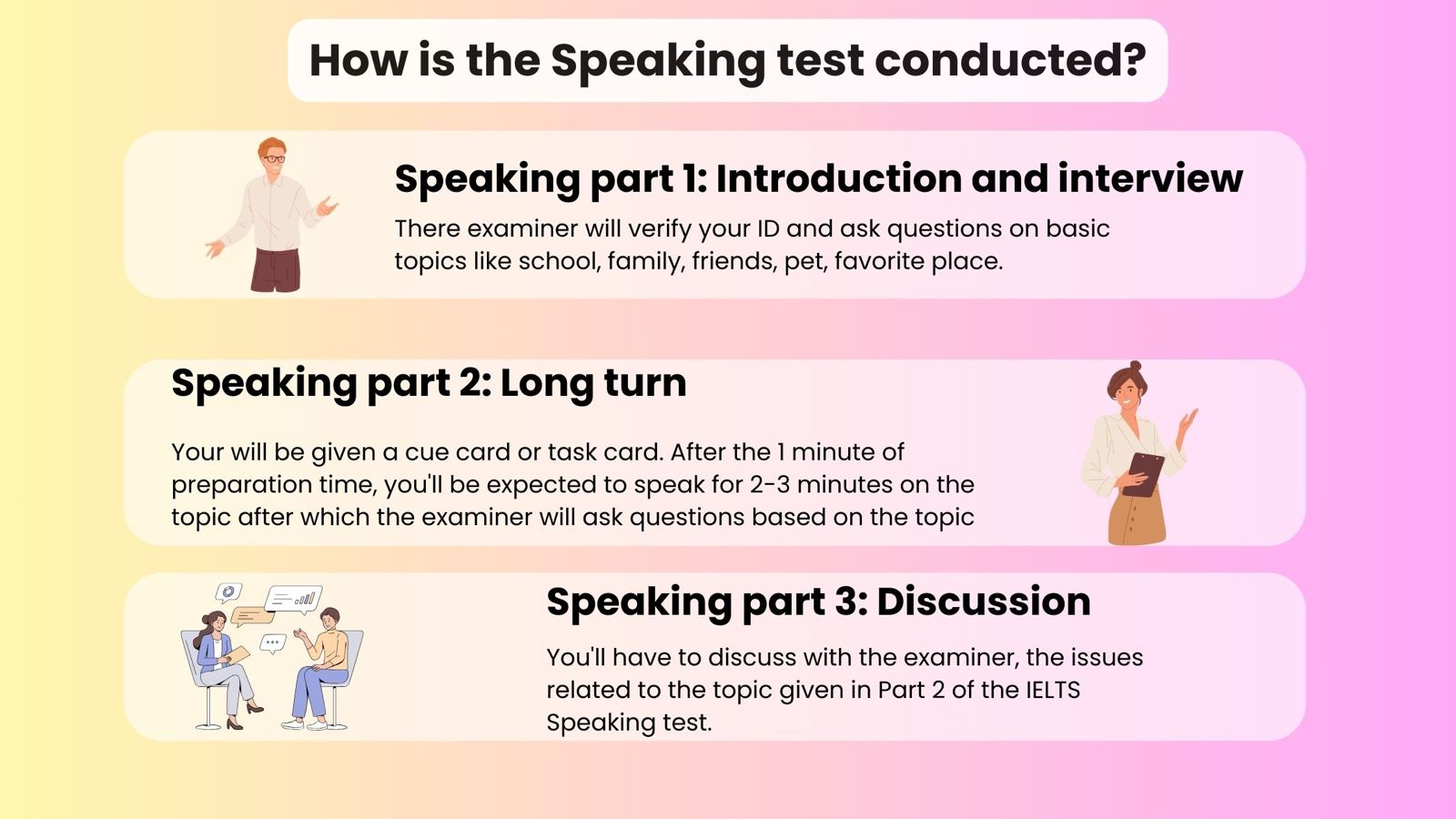Understanding the IELTS Speaking Test
The IELTS Speaking test assesses your ability to communicate effectively in English. As a vital part of the IELTS exam, it evaluates your fluency, vocabulary, grammar, and pronunciation. In this comprehensive guide, we will explore the three parts of the IELTS Speaking test, provide sample questions and answers, and share valuable tips to help you succeed.
Understanding the IELTS Speaking Test
Overview of the IELTS Speaking ModuleThe IELTS Speaking module consists of a personal interview between the test taker and a certified examiner, lasting a total of 11-14 minutes. The test is divided into three distinct parts:
- Part 1: Introduction and Interview (4-5 minutes) The examiner will introduce themselves and ask the test taker to introduce themselves as well. This section includes general questions about familiar topics such as home, work, and studies.
- Part 2: Cue Card (3-4 minutes) In this part, the test taker receives a cue card with a specific topic. They will have one minute to prepare before speaking for 1-2 minutes about the topic.
- Part 3: Discussion (4-5 minutes) This section involves a more in-depth discussion based on the topic from Part 2. The examiner will ask questions that encourage the test taker to elaborate on their thoughts and ideas.
If you're unsure about how the IELTS Speaking test is structured, check out the infographic for more detailed information.

Let's take a closer look at what happens in each part of the IELTS Speaking test.
IELTS Speaking Part 1: Introduction and Interview
In IELTS Speaking Part 1, the examiner will ask general questions about your personal life, such as your family, work or studies, and interests. This section assesses your ability to communicate your thoughts and opinions on everyday topics.
Sample Questions for Part 1- What is your full name?
- Where are you from?
- Do you work or study?
- What are your hobbies?
Here’s a list of frequently encountered topics in IELTS Speaking Part 1:
- Advertisements
- Art
- Bags
- Celebrities
- Chocolate
Here’s a list of frequently encountered topics in IELTS Speaking Part 1:
Tips for IELTS Speaking Part 1- Practice Regularly: Enhance your fluency and confidence by speaking English frequently.
- Familiarize Yourself: Review common topics and questions to prepare effectively.
- Engage with the Examiner: Maintain a friendly demeanor to create a comfortable atmosphere.
- Provide Detailed Answers: Go beyond simple 'yes' or 'no' responses to demonstrate your language skills.
- Diversify Your Language: Use a range of vocabulary and grammatical structures to showcase your proficiency.
- Focus on Pronunciation: Ensure your speech is clear and understandable, paying attention to intonation.
- Maintain Natural Speech Pace: Avoid rushing or speaking too slowly; find a comfortable rhythm.
IELTS Speaking Part 2: Cue Card
In IELTS Speaking Part 2, you will receive a cue card with a specific topic. After one minute to prepare, you will need to speak on that topic for two minutes. The examiner may follow up with one or two questions related to your response.
Sample Cue Card Topic Describe a memorable trip you took.You should cover:
- Where you went
- Who you went with
- What activities you did
- Why it was memorable
Tips for IELTS Speaking Part 2
- Understand the Task: Ensure you know what the topic and task require.
- Organize Your Thoughts: Use the one-minute preparation to structure your response.
- Speak for Two Minutes: Maximize the time to display your language skills.
- Use Diverse Vocabulary: Incorporate varied vocabulary and grammar for clarity.
- Share Personal Examples: Use specific anecdotes to support your points.
- Maintain Eye Contact: Speak naturally and confidently, engaging with the examiner.
IELTS Speaking Part 3: Discussion
In IELTS Speaking Part 3, the examiner will ask deeper, abstract questions related to the topic from Part 2. This section evaluates your ability to express and justify your opinions, analyze issues, and speculate on various topics.
Sample Discussion Questions (Related to Travel)
- Why do people enjoy traveling abroad?
- Does tourism have more advantages or disadvantages?
- How can governments promote sustainable tourism?
Common Topics in IELTS Speaking Part 3
Here’s a list of common themes for Part 3 discussions:
- Public Speaking
- Leadership
- Travel and Holidays
- Beauty
- Television Programs and Movies
Tips for IELTS Speaking Part 3
- Listen Carefully: Pay attention to the questions and comprehend what is being asked.
- Support Your Answers: Use specific examples and evidence to back up your responses.
- Explain Clearly: Articulate your thoughts logically and coherently.
- Use Varied Language:Employ a broad range of vocabulary and sentence structures.
- Directly Address Questions: Respond precisely to the examiner’s inquiries.
- Organize Your Ideas: Use linking words to ensure your speech flows well.
- Speak Confidently: Maintain a positive attitude while expressing your views.
- Provide Insightful Responses: Avoid vague answers; aim for detailed and thoughtful replies.
IELTS Speaking Scoring Criteria
Your performance in the Speaking test is evaluated on four criteria, each accounting for 25% of your overall IELTS band score:
- Fluency and Coherence: The smoothness and logical connection of your speech.
- Lexical Resource: The range and accuracy of your vocabulary.
- Grammatical Range and Accuracy: Your command of English grammar.
- Pronunciation: The clarity of your speech and appropriate intonation.
Each criterion is scored on a scale of 0-9, and the average of these scores determines your overall IELTS Speaking band score.
Example Calculation of Your IELTS Speaking Score
Assuming you receive the following scores:
- Fluency and Coherence: 6
- Pronunciation: 7
- Lexical Resource: 7
- Grammatical Range and Accuracy: 8
Your overall band score would be calculated as follows: (6 + 7 + 7 + 8) / 4 = 7
Strategies for Success in IELTS Speaking
- Regular Practice: Engage in practice tests with language partners, teachers, or online resources.
- Familiarize Yourself with Topics: Review common IELTS Speaking themes and questions.
- Record Your Speaking: Analyze recordings to identify areas for improvement.
- Expand Your Vocabulary: Learn topic-related words and phrases.
- Enhance Grammatical Range: Use more complex sentence structures in your responses.
- Improve Listening Skills: Cultivate active listening to understand questions better.
Advanced Techniques for IELTS Speaking
- Use Idiomatic Expressions: Incorporate natural idioms and colloquial phrases to show fluency, e.g., "It cost an arm and a leg."
- Employ Discourse Markers: Utilize linking words like "furthermore," "however," and "consequently" to connect ideas seamlessly.
- Rephrase When Necessary: If your point isn’t clear, rephrase it for clarity.
- Ask for Clarification: Politely request the examiner to repeat or rephrase unclear questions.
- Engage with the Examiner: Maintain a friendly demeanor and make eye contact.
- Vary Speech Pace and Intonation: Adjust your speaking rate and use appropriate pauses for a natural delivery.
- Provide Extended Responses: Elaborate with examples and anecdotes to illustrate your points.
- Stay Informed on Current Affairs: Mention contemporary events when relevant to demonstrate awareness.
- Express Opinions Tactfully: Acknowledge differing perspectives while articulating your own views.
- Show Critical Thinking: Analyze issues from multiple angles and speculate on potential consequences.
Common Mistakes to Avoid in IELTS Speaking
- Short Responses: Avoid giving brief or one-word answers; expand your responses.
- Memorized Answers: Refrain from reciting scripted responses, as examiners seek spontaneous speech.
- Inconsistent Speaking Pace: Don’t speak too quickly or too slowly; maintain a natural rhythm.
- Frequent Errors: While minor mistakes are acceptable, recurring grammatical or pronunciation issues can hurt your score.
- Irrelevant Information: Stay focused on the questions and avoid going off-topic.
By implementing these strategies, practicing consistently, and staying attentive during the test, you can enhance your performance and increase your chances of achieving your desired IELTS Speaking band score.
IELTS Speaking Practice Test Sample
This practice test includes example answers to help you improve your IELTS speaking score. Review the responses carefully.
Speaking Part 1
- What is your full name?
- My name is Ridhima Saxena.
- Can I see your ID?
- Yes, here is my ID
- Where are you from?
- I’m from Delhi, which is the fourth largest city in India. This city, known as the "City of Kings," boasts a rich history. Delhi is also the capital of India and is famous for its delicious food and historical monuments.
- Do you work or study?
- Currently, I study at one of the top universities in India, which has a friendly and helpful faculty. They not only teach subjects but also provide us with a lot of extra knowledge.
Speaking Part 2
Describe your favorite song.You should say:
- What this song is about
- When you listened to this song for the first time
- How often you listen to this song
- And explain why you think it is your favorite
Sample Answer: My favorite song is “Fast Car” by Tracy Chapman. This song captures the essence of the "American Dream" that many people aspire to achieve. The singer recounts her childhood struggles, such as her father's drinking and the grind of working at a convenience store for little money. Ultimately, she escapes her family problems and seeks a better life in the city with her boyfriend.
I first heard this song in the 90s when I was a child; it takes me back to those good old days. Interestingly, I initially thought it was sung by a man because of the depth of the singer's voice. I believe that this depth adds to the song's catchy appeal. Nowadays, I listen to it about once a week.
This song is my favorite not only because of the singer’s captivating voice but also due to the compelling story it tells. Listening to it allows me to empathize with her hardships, and by the end of the song, I feel hopeful for their quest for a better life. It truly is a timeless piece!
Speaking Part 3
- Why do you think that some local singers or musicians aren’t as successful as some from other countries?
- I believe that fame often comes down to luck. Those born in countries like the United States, which play a significant role in pop culture, tend to find success more easily. It's unfair that some individuals are born into privileges that pave the way for fame and wealth. For instance, many famous singers come from wealthy backgrounds or have famous parents, which often helps them in their careers. Unfortunately, it's all about who you know!
- Do you think the Internet has affected the music industry? In what ways?
- I definitely believe that the internet has significantly impacted the music industry. For one, artists have likely lost revenue due to illegal downloads. On the other hand, the internet has made it much easier for artists to reach a global audience. In this digital age, information is just a click away, and it’s easier than ever to promote oneself. I wonder if this means that the already famous will become even more renowned!
- Do you think there will be further changes in the music industry in the future?
- Like many other sectors, I think the music industry will continue to evolve. Today, music production is increasingly reliant on electronic devices instead of traditional instruments. Unlike in the past, musicians can create music without ever picking up an instrument. I firmly believe that technology will play an even larger role in shaping the future of the music industry.
- Do you think the music young people listen to in your country is becoming more globalized? Why/Why not?
- Absolutely! Young people today are enjoying American hits alongside K-pop. American music has always been a global force and continues to spread at an incredible pace. I believe almost everyone can sing along to popular American songs! Additionally, K-pop is becoming a sensation among teenagers in Asia and is likely to capture hearts around the world.



